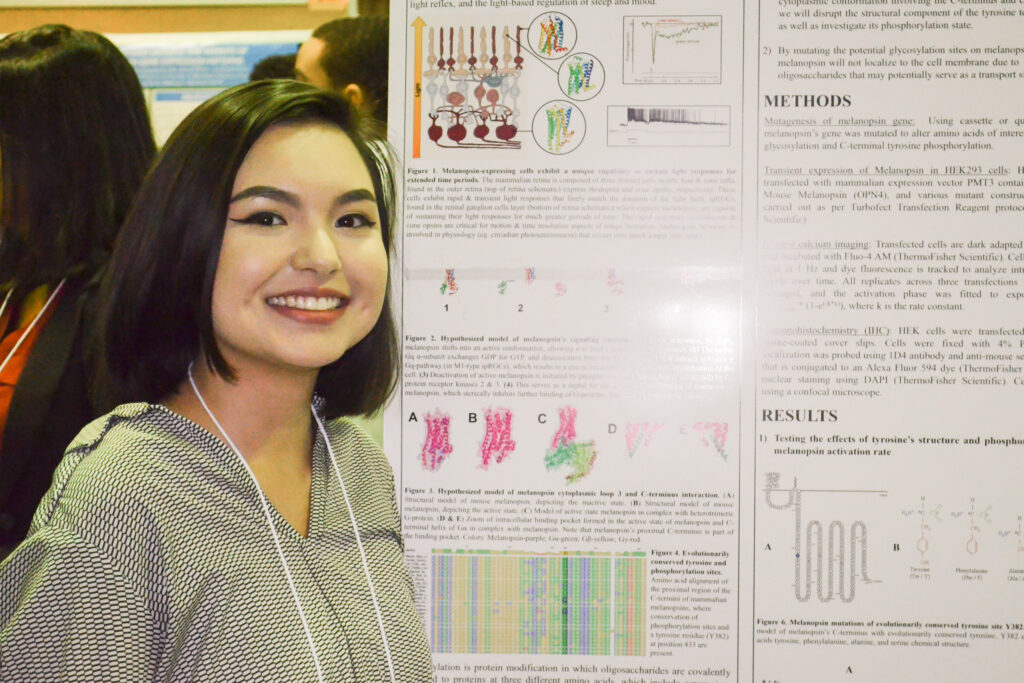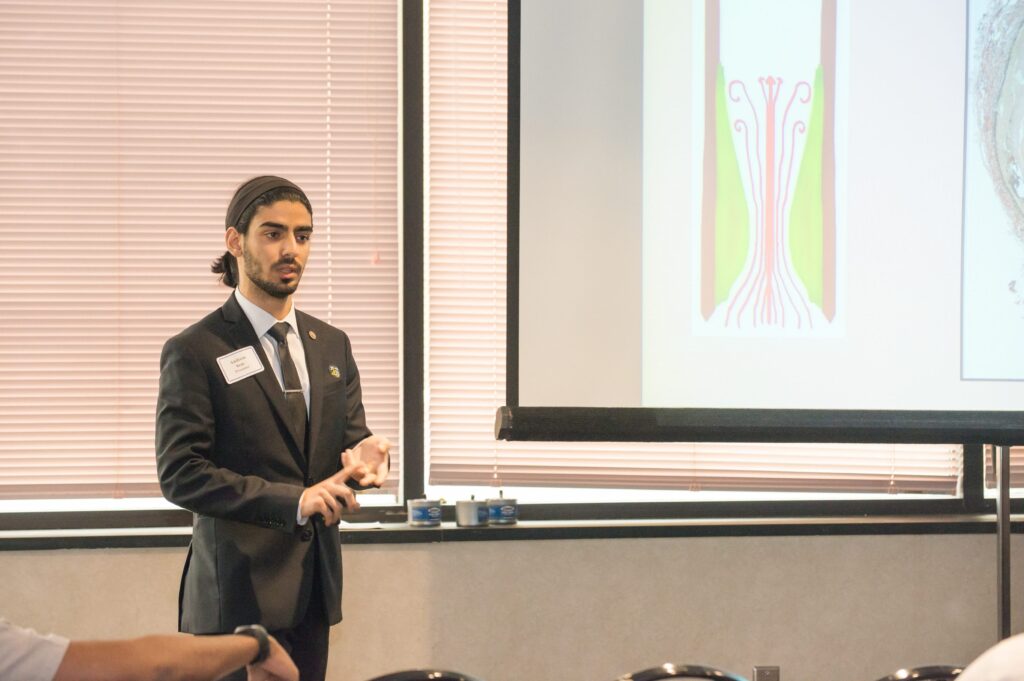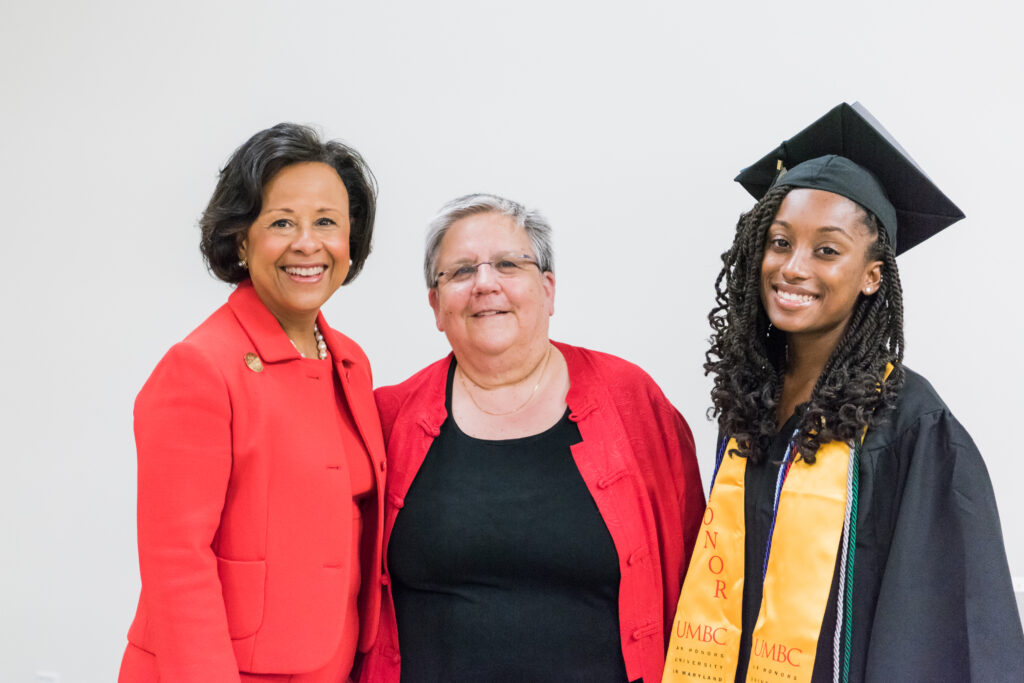Since it launched at UMBC in 1997, the MARC U*STAR Program has connected nearly 500 hundred UMBC students with research opportunities and invaluable support. After years of remarkable results, the program is now at an important moment of transition.
MARC U*STAR stands for Maximizing Access to Research Careers Undergraduate Student Training in Academic Research. The NIH program was founded on three key elements that are proven to increase students’ persistence and success in research careers, especially for students from underrepresented groups in biomedical sciences. These elements include recognizing and recruiting outstanding, passionate students; offering excellent research mentorship; and providing strong administrative support and advising.
A striking 95 percent of UMBC’s MARC U*STAR Scholars have graduated with STEM degrees, around double the national rate for students who begin STEM programs. And 91 percent have continued their education in graduate programs, with 80 percent pursuing Ph.D., M.D./Ph.D., or M.D. degrees. UMBC’s MARC U*STAR graduates have been almost five times more likely to attend graduate school than their academically comparable peers.

MARC U*STAR Scholar Robin Bailey ’20, biological sciences, with her research poster at UMBC’s Undergraduate Research and Creative Achievement Day (URCAD) in 2018. Photo by Phyllis Robinson.
“If I was not a part of the MARC program, I would not be where I am today,” says Robin Bailey
’20, biological sciences. Today, she is about to graduate from UMBC
having presented her research at national conferences and written two
academic papers. She spent a summer researching at Harvard, and now has
committed to pursuing her Ph.D. in cellular and molecular biology at the
University of Pennsylvania’s Perelman School of Medicine.
Bailey’s experience is a familiar one in UMBC’s MARC U*STAR program. This unequivocal, long-term success is not an accident.
Growth mindset
As the final year of the current MARC U*STAR grant comes to a close this May, UMBC has received a new five-year grant from the NIH. This new grant is part of the Undergraduate Research Training Initiative for Student Enhancement (U-RISE). It will build on the strong legacy of MARC U*STAR at UMBC, providing $7.7 million over five years to support the same activities offered by MARC U*STAR, plus a few more.
“The MARC grant is 23 years old, and it’s had great success,” says Phyllis Robinson, program director for MARC U*STAR at UMBC and lead on the new U-RISE grant. “So we’re going to take all the good things, and then add a few new things.”
MARC U*STAR provides students intensive academic advising and funding for conference travel and toward tuition. Advising includes traditional guidance on course selection, as well as support in preparing for and obtaining research positions and help with the graduate school application process. Monthly lectures from external STEM professionals connect the scholars with experts in various fields and give them opportunities to network.

MARC U*STAR Scholar Andreas Seas ’17, biochemical engineering, gives a presentation at URCAD 2016.
Nurturing student passion
Perhaps most importantly, the MARC program helps create a sense of community among the scholars. “Being a part of the MARC family is advantageous not only because you’re getting extra support to go to conferences, but you’re surrounded by all these people that are interested in science and want to improve people’s lives with science,” reflects Andreas Seas ’17, biochemical engineering.
Seas particularly notes the support of Lasse Lindahl, Robinson’s predecessor; Jackie King, assistant director of the MARC U*STAR program at UMBC; and his peers and research mentors. Today, Seas is pursuing an M.D./Ph.D. degree at Duke University.
“The MARC program solidified my love for research and science,” adds Erwin Cabrera ’10, biological sciences. “It provided me with the mentoring and one-on-one advising that was pivotal in my success at UMBC.” Cabrera is paying that mentorship forward in his current role as director of the Research Aligned Mentorship Program at Farmingdale State College in New York.

MARC U*STAR Scholar Erwin Cabrera ’10, biological sciences. Photo courtesy Erwin Cabrera.
Resilience on the rise
The new U-RISE funding will offer all of the same programming as MARC for up to 35 students per year. On top of that, U-RISE Scholars will participate in two training workshops. One will examine rigor and reproducibility in research. The other will focus on how to work with big data, which has become ubiquitous in so many research fields. U-RISE will also fund training for faculty mentors in how to best support their diverse mentees.
Current MARC Scholars will be able to continue with the program through graduation.

Phyllis Robinson (center) with Paula Johnson, president of Wellesley College (left), and UMBC valedictorian and MARC U*STAR Scholar Eudorah Vital ’18, biochemistry and molecular biology, at Commencement.
This is all heartening news for Bailey. “The MARC program has
provided me with countless opportunities to improve my skills in the
laboratory and develop a scientific mind. The program also pushes MARC
Scholars to show proof of these skills at scientific conferences,” she
says. “Where I once lacked confidence in my ability to think critically
and present publicly, I now have a resilient drive to overcome
obstacles.”
Until now, “for students who want to pursue a research career in biomedical sciences, the MARC program has been the place to be,” Bailey says. Now, that place will be U-RISE.
While the name will be new after 2020, the work and commitment of faculty mentors and advising staff will hold steady. Under Robinson’s leadership, they’ll continue to help UMBC students see themselves as future leading scientists and find their paths to research careers.
Banner image: Academic Row at UMBC in springtime. All photos by Marlayna Demond ’11 for UMBC unless otherwise noted.
###
- For additional UMBC Science and Technology stories, visit the UMBC News site.
- For additional stories about the UMBC community, visit the UMBC Magazine site.
- For additional COEIT stories, visit the COEIT site.
- For additional COEIT Research Highlights, including Publications Spotlights, visit the COEIT Research pages on the COEIT Dean's Office site.